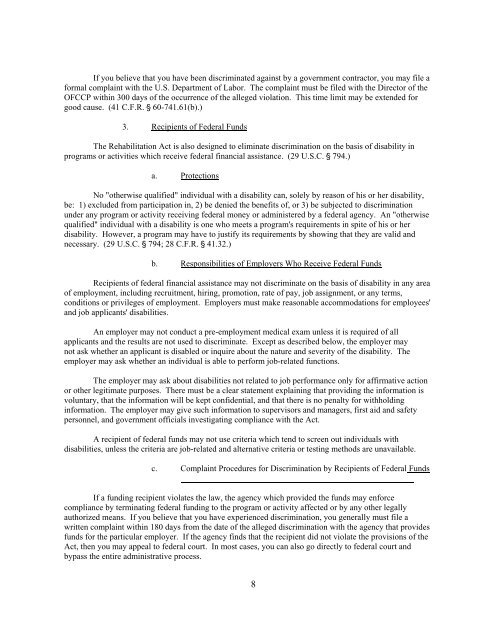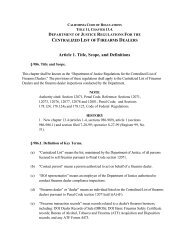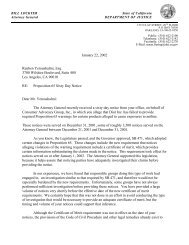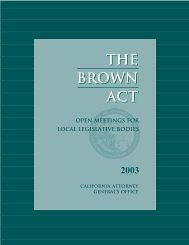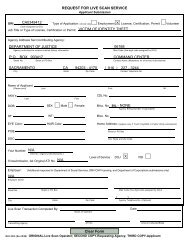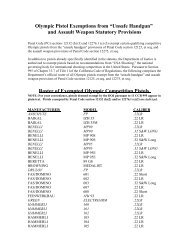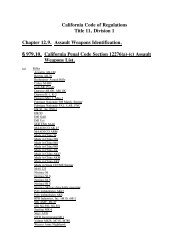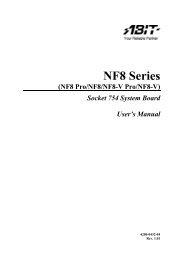Legal Rights of Persons With Disabilities - Ossh.com
Legal Rights of Persons With Disabilities - Ossh.com
Legal Rights of Persons With Disabilities - Ossh.com
You also want an ePaper? Increase the reach of your titles
YUMPU automatically turns print PDFs into web optimized ePapers that Google loves.
If you believe that you have been discriminated against by a government contractor, you may file a<br />
formal <strong>com</strong>plaint with the U.S. Department <strong>of</strong> Labor. The <strong>com</strong>plaint must be filed with the Director <strong>of</strong> the<br />
OFCCP within 300 days <strong>of</strong> the occurrence <strong>of</strong> the alleged violation. This time limit may be extended for<br />
good cause. (41 C.F.R. ' 60-741.61(b).)<br />
3. Recipients <strong>of</strong> Federal Funds<br />
The Rehabilitation Act is also designed to eliminate discrimination on the basis <strong>of</strong> disability in<br />
programs or activities which receive federal financial assistance. (29 U.S.C. ' 794.)<br />
a. Protections<br />
No "otherwise qualified" individual with a disability can, solely by reason <strong>of</strong> his or her disability,<br />
be: 1) excluded from participation in, 2) be denied the benefits <strong>of</strong>, or 3) be subjected to discrimination<br />
under any program or activity receiving federal money or administered by a federal agency. An "otherwise<br />
qualified" individual with a disability is one who meets a program's requirements in spite <strong>of</strong> his or her<br />
disability. However, a program may have to justify its requirements by showing that they are valid and<br />
necessary. (29 U.S.C. ' 794; 28 C.F.R. ' 41.32.)<br />
b. Responsibilities <strong>of</strong> Employers Who Receive Federal Funds<br />
Recipients <strong>of</strong> federal financial assistance may not discriminate on the basis <strong>of</strong> disability in any area<br />
<strong>of</strong> employment, including recruitment, hiring, promotion, rate <strong>of</strong> pay, job assignment, or any terms,<br />
conditions or privileges <strong>of</strong> employment. Employers must make reasonable ac<strong>com</strong>modations for employees'<br />
and job applicants' disabilities.<br />
An employer may not conduct a pre-employment medical exam unless it is required <strong>of</strong> all<br />
applicants and the results are not used to discriminate. Except as described below, the employer may<br />
not ask whether an applicant is disabled or inquire about the nature and severity <strong>of</strong> the disability. The<br />
employer may ask whether an individual is able to perform job-related functions.<br />
The employer may ask about disabilities not related to job performance only for affirmative action<br />
or other legitimate purposes. There must be a clear statement explaining that providing the information is<br />
voluntary, that the information will be kept confidential, and that there is no penalty for withholding<br />
information. The employer may give such information to supervisors and managers, first aid and safety<br />
personnel, and government <strong>of</strong>ficials investigating <strong>com</strong>pliance with the Act.<br />
A recipient <strong>of</strong> federal funds may not use criteria which tend to screen out individuals with<br />
disabilities, unless the criteria are job-related and alternative criteria or testing methods are unavailable.<br />
c. Complaint Procedures for Discrimination by Recipients <strong>of</strong> Federal Funds<br />
If a funding recipient violates the law, the agency which provided the funds may enforce<br />
<strong>com</strong>pliance by terminating federal funding to the program or activity affected or by any other legally<br />
authorized means. If you believe that you have experienced discrimination, you generally must file a<br />
written <strong>com</strong>plaint within 180 days from the date <strong>of</strong> the alleged discrimination with the agency that provides<br />
funds for the particular employer. If the agency finds that the recipient did not violate the provisions <strong>of</strong> the<br />
Act, then you may appeal to federal court. In most cases, you can also go directly to federal court and<br />
bypass the entire administrative process.<br />
8


